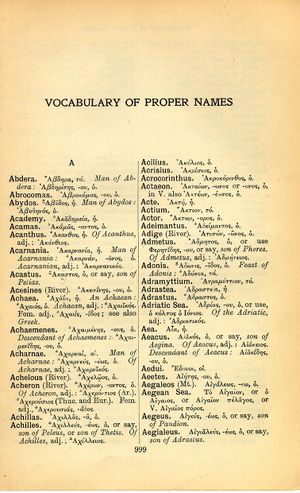Adrastea: Difference between revisions
Πρόσεχε τῷ ὑποκειμένῳ ἢ τῇ ἐνεργείᾳ ἢ τῷ δόγματι ἢ τῷ σημαινομένῳ. → Look to the essence of a thing, whether it be a point of doctrine, of practice, or of interpretation.
m (Text replacement - "link={{" to "link={{") |
(1) |
||
| Line 11: | Line 11: | ||
{{Georges | {{Georges | ||
|georg=Adrastēa (od. -īa), ae, f. ([[Ἀδράστεια]]), die Unentfliehbare, Unentrinnbare, [[Beiname]] der [[Nemesis]] (s. [[Nemesis]]), Amm. 14, 11, 25; 22, 3, 12. Apul. de [[mundo]] 38. Ps. Verg. Cir. 239. | |georg=Adrastēa (od. -īa), ae, f. ([[Ἀδράστεια]]), die Unentfliehbare, Unentrinnbare, [[Beiname]] der [[Nemesis]] (s. [[Nemesis]]), Amm. 14, 11, 25; 22, 3, 12. Apul. de [[mundo]] 38. Ps. Verg. Cir. 239. | ||
}} | |||
{{esel | |||
|sltx=[[Ἀδράστεια]], [[Ἀδράστειος]] | |||
}} | }} | ||
Revision as of 06:51, 22 August 2017
English > Greek (Woodhouse)
Ἀδραστεία, ἡ.
Latin > English (Lewis & Short)
Ā̆drastēa: or Ā̆drastīa, ae, f., = Ἀδράστεια.
I The daughter of Jupiter and Necessity (so called from an altar erected to her by Adrastus), the goddess who rewards men for their deeds, and who esp. punishes pride and arrogance: quod nec sinit Adrastea, Verg. Cir. 239: ineffugibilis, App. de Mund. p. 75; Amm. 14, 11.—
II A city of Mysia, later called Parium, Plin. 5, 32, 40, § 141; Just. 11, 6, 10.
Latin > French (Gaffiot 2016)
Adrastēa (-tīa), æ, f. (Ἀδράστεια), surnom de Némésis : Amm. 14, 11, 25 ; 22, 3, 12.
Latin > German (Georges)
Adrastēa (od. -īa), ae, f. (Ἀδράστεια), die Unentfliehbare, Unentrinnbare, Beiname der Nemesis (s. Nemesis), Amm. 14, 11, 25; 22, 3, 12. Apul. de mundo 38. Ps. Verg. Cir. 239.

